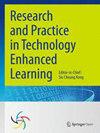上Facebook的强度对学术自我效能感有影响吗?路径分析法
IF 3
Q1 EDUCATION & EDUCATIONAL RESEARCH
Research and Practice in Technology Enhanced Learning
Pub Date : 2022-12-28
DOI:10.58459/rptel.2023.18026
引用次数: 0
摘要
关于Facebook对教育的影响,有各种各样的证据,一些研究表明,使用Facebook如何促进学业成绩,而另一些调查显示,使用Facebook与学业自我效能和成绩下降等不适应的教育结果有关。先前的研究也非常关注这种社交网络在西方社会(如美国)的学术相关后果,这可能对非西方国家的学生具有有限的普遍性。本研究采用路径分析法,探讨Facebook使用强度维度是否能预测菲律宾大学生的学业自我效能感和学习习惯,从而为这一线性证据做出贡献。对566名菲律宾大学生进行了一份包括Facebook使用和学术自我效能的问卷调查。通过全最大似然估计方法进行的通径分析结果表明,自我表达对学业自我效能感有正向影响,而过度使用对学业自我效能感有负向影响。无聊积极地预示着学习习惯。本研究对理解使用社交媒体平台的不同动机如何影响高等教育背景下的学术行为具有启示意义。本文章由计算机程序翻译,如有差异,请以英文原文为准。
Does Facebook intensity matter for academic self-efficacy? A path analytic approach
There is mixed evidence about the educational impacts of Facebook with some research indicating how using Facebook facilitates academic outcomes while other investigations showing the link of Facebook usage to maladaptive educational outcomes such as reduced academic self-efficacy and performance. Prior studies also paid much attention to the academic-related consequences of this social networking in Western societies such as the United States which might have limited generalizability to students from non-Western countries. This study contributes to this line evidence by exploring whether Facebook use intensity dimensions would predict academic self-efficacy and study habits in selected Filipino undergraduate students using a path analytic approach. A survey packet comprising questionnaires about Facebook use and academic self-efficacy was administered to 566 Filipino undergraduate students. Results of path analysis via full maximum likelihood estimation approach demonstrated that whereas self-expression positively predicted academic self-efficacy, overuse negatively predicted this outcome. Boredom positively predicted study habits. This research has implications for understanding how different motives of using social media platforms can influence academic behaviors in higher education contexts.
求助全文
通过发布文献求助,成功后即可免费获取论文全文。
去求助
来源期刊

Research and Practice in Technology Enhanced Learning
Social Sciences-Education
CiteScore
7.10
自引率
3.10%
发文量
28
审稿时长
13 weeks
 求助内容:
求助内容: 应助结果提醒方式:
应助结果提醒方式:


